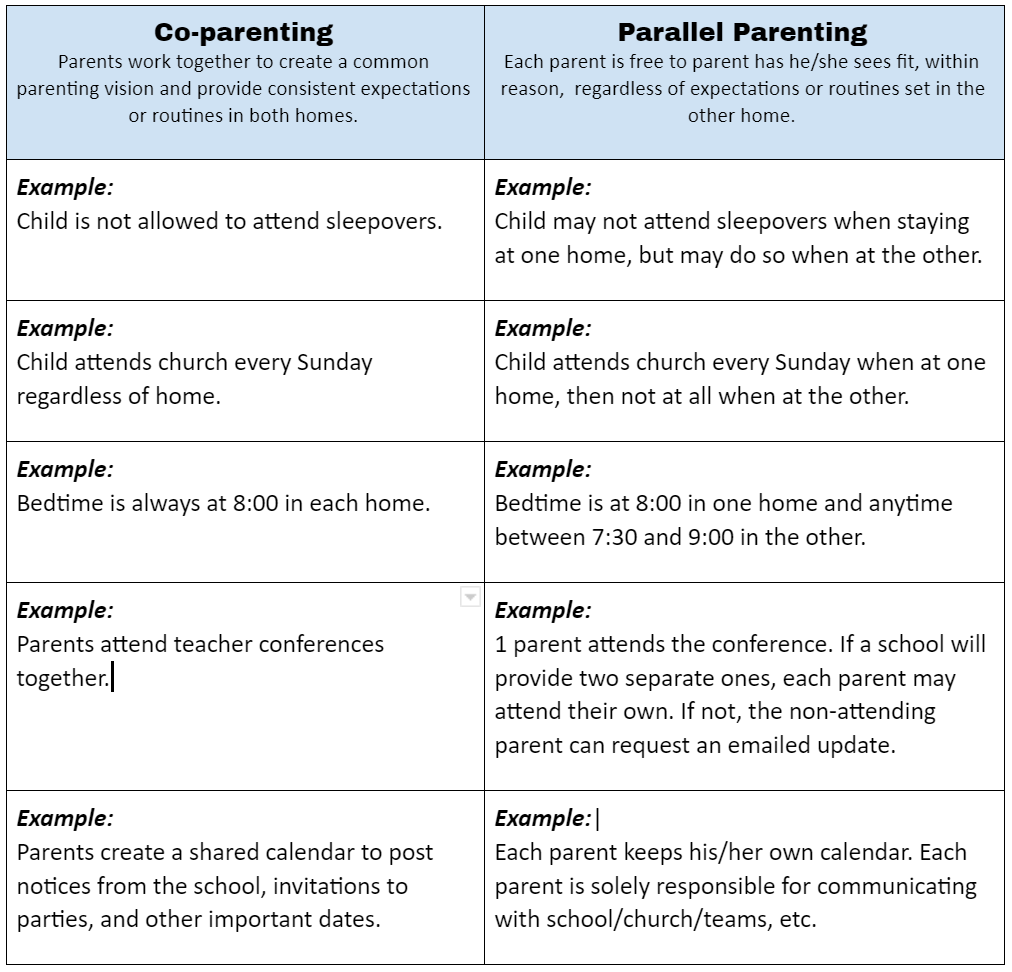Photo by Xavier Mouton Photographie on UnsplashCo-Parenting Co-parenting is all the rage. Conceptually, it is awesome. It requires two well-adjusted, divorced adults who are committed and able to put their personal hurt and emotions aside in the interest of working jointly in their child’s best interest. Co-parenting demands ongoing communication between the parents and regular interaction. It seeks to unify the parenting styles across the two households, and through consensus, to establish consistent, common routines and expectations in both homes. Ummmm...No Thanks? Does this sound like a nightmare to you? You’re not alone. In my world, as a divorce attorney who deals with many high conflict situations, the co- parenting model is an untenable pipe dream. In a high conflict relationship, parents are unable to effectively communicate productively at all. They definitely cannot set aside their own adult emotions and needs for the benefit of a child. Control is wielded as a tool of power, and even little compromises are unfathomable. Not even when a judge is involved. To minimize high-intensity interactions, some courts have ordered a very different parenting model, whereby the divorced couple each parent unilaterally during his or her respective parenting time with the primary benefit of minimizing interactions. Enter Parallel Parenting: First and foremost, parallel parenting is only employed when both parents are safe, mentally stable, sober, and healthy. If a child’s well-being is ever in question, contact a lawyer immediately to seek a temporary order. Safety first! Parallel parenting encourages minimal interaction or communication. Information is still shared, but almost all communications are via email (or some form of writing) to document the communication and eliminate live improvisation. Parallel parenting recognizes that there will be no consensus between the two estranged parents, and that each is capable of establishing healthy and reasonable routines, in their respective homes, with very little interaction. What Does This Look Like? 5+1 Parallel Parenting Must-Dos!
Let go of the guilt. All marriages and divorces are unique...and 10% of divorces are high-conflict. In most high-conflict divorces, one party is the antagonist due to mental illnesses and/or substance abuse. If you're reading this, odds are you're not the cause of the conflict. Parallel parenting is not a lesser-than strategy. It's not a give-up. Gwenyth Paltrow is not going to show up at your house to parent-shame you and discuss conscious uncoupling (ugh). Parallel parenting is a conscious and strategic technique to minimize unnecessary conflict with an antagonistic ex so you can save money and build a more peaceful future for yourself and your children. This article is not intended to determine which method is better, but to recognize that more than one option is available. Each family needs to avail themselves of the model that best fits their situation and needs. In many of my cases, co-parenting is NOT a viable option; in fact, it can be damaging to try. Parallel parenting is something that works for many families, and ultimately, can be in the best interest of the child.
4 Comments
Divorce parties are a thing around the world. You can read about them almost anywhere. Parents Magazine published an article in February about them. You can find thousands of Pinterest boards offering party planning ideas. In 2017, The Guardian shared a story about how planning a divorce party for her best friend turned her into full-time divorce party planner. In 2018, Glamour Magazine published an article about divorce parties, sharing their Twitter, Facebook, and Instagram hashtags and revealing shocking party price tags of up to $20,000. For a good laugh, you can even visit Buzzfeed to see 24 Hilarious Divorce Cakes That Are Even Better Than Wedding Cakes.
As a family law attorney, I’ve had several clients host divorce parties. In fact, a client whose divorce was finalized this month is planning one as I type this. In all of the cases I’ve experienced, divorce parties were not about celebrating divorce itself. Divorce, even in its most evolved iterations, is typically painful and disappointing on some level...certainly not party-prompting. Rather, the divorce parties I’ve witnessed are always about reconnecting with friends essential to moving life forward. They are also about providing closure to a painful but positive milestone in life. Maybe these parties are misnamed entirely. Phoenix parties? Lotus luaus? Gloria Gaynor galas? If you’re considering a divorce party of your own, or hosting one for a friend or family member, I have some practical suggestions to consider (I know - buzz kill family law attorney strikes again!). The majority of my clients are in high-conflict divorce situations...so I’m always sensitive to minimizing antagonism. In high-conflict situations, even the rumor of a ‘divorce party’ would prompt retaliation, venom, confrontation, or harassment. Outside of a high-conflict situation, in the world of relatively well-adjusted adults, news of a divorce party still has the potential to hurt feelings, cause discomfort, and burn bridges unnecessarily. In the spirit of moving forward positively...and doing no collateral harm...here are 5 divorce party recommendations:
Whether you’re a fan or not, divorce parties are a widespread reality around the world. Here’s to hoping that are supportive and future-focused celebrations that affirm life, strengthen friendships, and bring healthy closure to a complicated milestone! HuffPost’s Test Kitchen ran an incredibly powerful article a few years ago, This Is Not a Love Story, chronicling the overwhelming intimate partner violence and homicide in the US, then followed that up with a CDC summary titled Who Is Killing American Women, Their Husbands and Boyfriends, CDC Confirms. Sadly, this is a seemingly never-ending reality that continues to play out in our news cycle. Just this year, in our own Phoenix community, Dwight Lamon Jones killed six people in a rage of violence fueled by his anger about his divorce and child custody arrangement. Just this month, John Formisano, in the midst of his divorce, shot and killed his wife and critically injured her friend.
These events are constant reminders that the amount of information people have about potential perpetrators of intimate partner violence varies, from John Formisano’s colleagues who described their shock about his actions as, “A tremendous understatement.” to Dr. Connie Jones’ assessment of her own ex-husband that, “I knew one day he would try to kill me”. Once family, friends, co-workers, and victims have knowledge of concerning behaviors and beliefs, we now have risk assessment tools that can be used as critical life saving tools. Some excellent ones can be found at womenslaw.org, the CDC, and the NCDSV. In my high-conflict family law speciality, in this day and age, I am always mindful of potential lethality. Divorce and child custody disputes rattle even the most steady and healthy adults, but time and time again we see that they can prove deadly for adults in high-conflict situations. Here’s to all of us helping protect our loved-ones through proactive awareness and intervention. Brittany Wong’s article in HuffPost, “10 Smart Back-to-School Tips for Divorced Parents”, offers helpful guidance to the lucky 90% of divorcing or divorced parents who are emotionally healthy and enjoy a reasonable relationship. Because the vast majority of my experience as a family law attorney comes from working with parents in high-conflict (HC) divorce cases, I see Wong’s article through a very different lens.
If you’re new to the term HC divorce, it’s one in which there is ongoing, unrelenting malice between the parties. These divorces, and their post-decree needs, persist far past the typical window of divorce...and in some cases, the court actions never end. There are often allegations (both valid and unsubstantiated) of domestic violence, physical abuse, sexual abuse, coercive control, substance abuse, and mental illness in high-conflict situations that make them complex and volatile. Often, they include multiple no-contact orders and/or orders of protection. Child support and parenting time issues are battles and often the stakes are high for the children. Because of the level of conflict between the parents, they are unable to communicate effectively about their children without clear guidelines, 3rd party support and/or the threat of court sanctions. If you are one of the unlucky HC 10%, the back-to-school suggestions in Wong’s article are DEFINITELY NOT FOR YOU. In fact, most of them can be counterproductive and several can be downright dangerous. To help parents in HC situations navigate back-to-school time, I have reframed the suggestions in this article for you: #1: Splitting Back-to-School Costs In a HC relationship, this is unlikely to happen and will lead to an unproductive argument. The parent who pays support will argue that back-to-school costs are included in their monthly payment. Also, HC relationships contain constant accusations that funds intended for the child are not being spent properly. My recommendation: Make sure a provision exists in your decree that expressly states who is responsible for back-to-school expenses, outline the amount, and define the process for back-to-school reimbursement. #2: Create a Shared Google Account In a HC relationship, this is nothing but a control mechanism. One parent will see this as the other trying to control them, and this will lead to more tension, fighting, and disputes. My recommendation: Each parent should provide a concise weekly summary of each child’s events and deliver this via email. This weekly summary should always be sent by a set day and time each week, and it should provide a brief summary of key events (school, medical, extracurricular, etc.) about both the past week and the week to come. I really like the ‘10 words or less’ recommendation for each summary item, as it helps parents stick to the point and eliminates emotional adverbs and adjectives. Each parent should understand and remember that written records are always key in the HC world. #3: Drop the Kids off Together on the First Day of School In a HC relationship, this could end in a police incident. I wish I were kidding. My recommendation: The parent who has parenting time is the only parent who should transport children to or from school on any regular or special day UNLESS there is an expressed agreement in writing in advance (good luck with that). #4: If Your Ex Can’t Be There for Day 1, Text a Pic For a HC relationship, this is terrible advice. I know it’s counter-intuitive, as it sounds so considerate on the surface. In my world, this will only be perceived as a taunt (“I’m here, you’re not, hahaha). My recommendation: Keep the picture for yourself UNLESS the other party requests it. If the request is made, kindly forward it without any editorializing; if they don’t request it, don’t share. #5: Let Your Kids’ Teachers Know Who’s Who in Your Blended Family This is ill-advised for HC situations for a variety of reasons. At the end of the day, there are only two parents with legal standing in the eyes of the school. My recommendation: If it is critical for your child’s academic or social development to share information about your home situation, do so briefly and free of editorializing. ALSO, keep in mind the limited capacity teachers have for communication. Elementary teachers have nearly 40 students...and some have 80 or 120 in schools with specialization. I know of many schools who place a limit of 3-5 sentences for parent emails to keep the reading manageable for teachers. Finally, remember that legitimate safety emergencies should be called in to the principal or delivered in person...often, school emails are not read until the end of the day. #6: Attend Parent-Teacher Conferences Together In HC relationships, this type of interaction will only introduce untoward personal conflicts into the child’s classroom...not to mention be unproductive while yielding subsequent disagreements and conflicting accounts of the meeting. My recommendation: Most schools are willing to offer two separate conferences in extreme circumstances. In cases where this is simply not doable, or if you feel that it is an unfair imposition, arrange for an email or recording of the conference as an alternative. #7: If an Ex Lives Out-of-State, Have Him/Her Call in to a Conference This isn’t necessarily a bad idea if the school and teacher are willing/able to accommodate the request, and the parent can listen without interjecting, but an asynchronous recording would be just as informative while better minimizing the conflict that stems from live interactions. Plus, there is always a documented version of the meeting asynchronously, which reduces conflicting interpretations/accounts of the meeting. #8: Set Times to Debrief Together In a HC situation, this is an explosive idea that will lead to new arguments and accusations at best, and court orders and arrests at worst. My recommendation: Abandon the commonly-touted practice of co-parenting (which surely isn’t working anyway in a HC relationship) and embrace parallel parenting. Co-parenting is not for you! If there is a court-mandated weekly summary, that practice eliminates face-to-face confrontations while still providing both parties with the necessary information to parallel parent effectively. #9: Don’t Leave Your Ex’s Side out of the Family Tree In any situation, a child should be responsible for collecting this information from each parent...as they are for all school assignments. Working from that belief, neither parent should need to contact the other for this (or any) school assignment...the child will lead this communication. My recommendation: Use the weekly summary provided by the other parent along with flyers, emails, and school portal communications to stay informed about homework assignments and projects. Each parent should be sure to sign up for all necessary school information accounts at the start of the year and maintain the responsibility of keeping themselves informed. Do not contact the other parent for this type of information. #10: Create a Group Chat to Discuss Your Child’s Wins and Progress NOPE. NEVER. In a HC situation, parties should seek to minimize, not increase, interactions and communications with each other. In fact, many HC parents employ a parenting coordinator to mitigate unfounded accusations and help keep those necessary communications timely, appropriate, and civil. My recommendation: I strongly encourage the weekly summaries described above. These summaries ensure important information is shared and documented while minimizing the never-productive contact between the HC parties. I hope this helps parents in the 10% high-conflict world navigate the tenuous back-to-school landscape. Recognize that your situation falls outside of the intuitive co-parenting norms embraced in the mainstream, let go of those practices, and shed any guilt you’re harboring about failing to function like the 90%.
|
AuthorJason Castle is a family lawyer who specializes in high-conflict cases. He's also a former prosecutor & social worker. Hear his latest divorce thoughts! Archives
January 2024
Categories |







 RSS Feed
RSS Feed